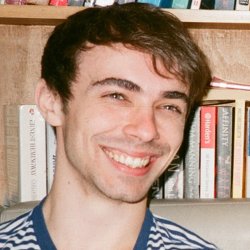
Dr Adam Burgess
Academic and research departments
Leverhulme Quantum Biology Doctoral Training Centre (QB-DTC), School of Mathematics and Physics.About
My research project
Non-Markovian dynamics in biomolecular complexesThe recent discovery of long-lived coherences in complex biological complexes has raised a fundamental question of how the fluctuations (noise) present in the natural biological environment can possibly allow the preservation of quantum coherence. Indeed, it has been suggested that not only the noise fails to produce decoherence, it may even be the case that the fluctuations are a crucial ingredient in the maintenance of the coherence.
Supervisors
The recent discovery of long-lived coherences in complex biological complexes has raised a fundamental question of how the fluctuations (noise) present in the natural biological environment can possibly allow the preservation of quantum coherence. Indeed, it has been suggested that not only the noise fails to produce decoherence, it may even be the case that the fluctuations are a crucial ingredient in the maintenance of the coherence.
ResearchResearch interests
My research interests include studying how subsystem coherences are impacted by non-Markovian reservoirs from an Open Quantum Systems framework. As well as how this relates to the fields of Quantum Information, Quantum Computing, Quantum Thermodynamics and Foundations of Quantum Mechanics.
Research interests
My research interests include studying how subsystem coherences are impacted by non-Markovian reservoirs from an Open Quantum Systems framework. As well as how this relates to the fields of Quantum Information, Quantum Computing, Quantum Thermodynamics and Foundations of Quantum Mechanics.
Publications
We develop a recurrent neural network framework to model the non-Markovian dynamics exhibited by two-level atoms interacting with the radiation reservoir of a photonic crystal. Despite the strong non-Markovianity of the atomic dynamics induced by the rapid spectral variation in photonic density of states of the photonic reservoir, our recurrent neural network approach is able to capture precise details in the atomic evolution, including the fractional steady-state atomic population inversion and spectral splitting of the atomic transition. We demonstrate the robustness of the recurrent neural network setup against reduced data sets and its effectiveness to deal with systems of increased complexity.
We explore the dynamics of N coupled atomic two-level systems embedded within a generic bosonic reservoir under specific system symmetries. In the regime of many atoms identically coupled to a single reservoir, we identify remarkable effects, notably that the initial configuration of the atomic excited-state amplitudes strongly impacts the dynamics of the system and can even fully sever the system from its environment. Additionally, we find that steady-state amplitudes of the excited states become independent of the specific structure of the bosonic reservoirs considered. The framework introduced is deployed to model a structured photonic reservoir associated with a photonic crystal, where it recaptures previous theoretical and experimental results for the superradiance rates even within the single-excitation regime. For the photonic band-gap system, our formalism predicts the generation of pairwise entanglement between initially uncorrelated atomic systems. Furthermore, it suggests that—with respect to a non-Markovian metric—the non-Markovianity of the aggregated many-atom system is modulated by the total number of atoms. This is due to a stark interplay between the Lamb shifting of the atomic transition energies due to their varying number and the increased number of atomic systems with resonant transition energies.